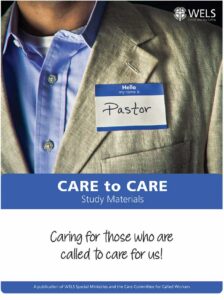 |
Connected. Supported. Encouraged.
We all want to feel these ways in our personal and professional lives. The same is true for congregational called workers. “While many calling bodies informally provide support to their workers, having an intentional, structured plan and organization makes sure workers are heard and encouraged,” says Joel Gaertner, director of WELS Special Ministries. Having a congregational Care Committee for Called Workers (CCCW) can provide that structure so congregations can make sure their workers are cared for.
St. John, Redwood Falls, Minn., has had a formal Care Committee for Called Workers for years, offering support to its 14 called workers and 2 support staff at its church and school. Five lay married couples form the committee, which is headed by Lance Otto, a member of the congregation’s Board of Elders. Each couple is assigned three to four called workers with whom they meet regularly.
 Otto says a couple from the committee is in contact with the called worker from the very beginning—right when the call is accepted. “It’s important they have that connection with someone from the congregation, even before they move,” he says. This is especially true because many called workers are moving away from their current support system.
Otto says a couple from the committee is in contact with the called worker from the very beginning—right when the call is accepted. “It’s important they have that connection with someone from the congregation, even before they move,” he says. This is especially true because many called workers are moving away from their current support system.
That connection continues with once-a-year formal visits and numerous check-ins throughout the year. “They are not just there to solve problems; they’re there to be supporters and encouragers,” says Otto. Having a contact couple also offers a safe place for called workers to share their concerns.
While having these go-to people is nice in good times, it’s critical in hard times. Ask Todd Brassow, principal at St. John. A called worker at St. John for the past seven years, he became the principal for the school in 2019—right before COVID-19 hit. “This program has been nice just to have additional support pieces in place for going through a hard time like we did with COVID,” he says. “For me—figuring it out as a new principal and a new dad and starting a master’s program—having the support there was huge.”
He also appreciates the annual formal visits, which allow him to review goals, blessings, and challenges from the previous year.
“Our Savior demonstrated a loving and caring heart for his disciples throughout his ministry. By his example, Jesus gave us a model of caring for our called workers. His command to love one another surely applies to Christians caring for the workers he sends us,” says Gaertner. “A local CCCW is often the best way to accomplish this.”
Learn more about how to set up a Care Committee for Called Workers in your congregation at wels.net/cccw.
Author: FIC
Volume: 111, Number 04
Issue: April 2024







